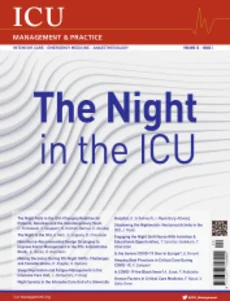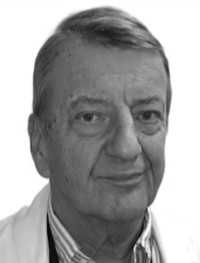Issues
Volume 20 - Issue 2, 2020
Tue, 11 Aug 2020

In this Issue
- Table of contents
- Editorial Board
- Download pdf (print optimised)
- Download pdf (screen optimised)
Editorial
The Night in the ICU
READ MOREThey say that in the world of the intensive care unit (ICU), there is no night. It can be qualified as a lesser day, but not really as a night. The hustle and bustle may be slower, patient flow and activity may be less, conversations may be negligible, and the staff on duty may be limited, but patient care continues, alarms are in place, and the usual "rhythm" of intensive care remains. You can still hear...
COVID-19 Management
Is the Severe COVID-19 Over in Europe?
READ MOREIs the worst over? Have patients most at risk already been affected and died? Or has the SAR-CoV-2 virus mutated to a less severe form? Where exactly do we stand with COVID-19? Undoubtedly, the COVID-19 pandemic has been a terrible experience - worse than expected for many worldwide. As we follow the COVID-19 situation, there is a tendency to focus on the many deaths as a way to quantify its severity. H...
Keeping Best Practices in Critical Care During COVID-19
READ MORECOVID-19 poses several challenges and has made it difficult to measure ICU performance. Sticking to evidence-based interventions can go a long way in improving outcomes and resource utilisation. Taking care of a COVID-19 patient comes with an initial surprise: there is no standard mindset to guide the physician’s work before entering a COVID-19 patient’s room. After some initial hesitation, most phy...
Is COVID-19 the Black Swan?
READ MORENassim Taleb, in his book, "The Black Swan: The Impact of the Highly Improbable," describes the term Black Swan as a rare, unknown event, which with hindsight is rationalised. Taleb talks about the human tendency to always find simplistic explanations for unknown events, what he calls the Black Swan theory. Is COVID-19 a black swan? Physicians working with critically ill patients are exposed to emerging...
COVID-19 Global Response – Strengths, Weaknesses, Success and Failure
READ MOREAn overview of the global response to the COVID-19 pandemic – the success of South Korea, the so-called herd-immunity experiment of Sweden and the not-so-brilliant COVID-19 management in the U.K. and the U.S. COVID-19 has created havoc around the globe. Some countries have managed to cope well with the crisis while others have not been as successful. An emerging COVID-19 success story is that of Sou...
Point-of-View
COVID-19 and the Potential Effects on the Cardiovascular System
READ MORECOVID-19 affects the myocardium and myocarditis and cardiac injury is a common condition among hospitalised patients. Landiolol, a new ultra-short acting, intravenous most β1 selective blocker, can help reduce inflammation and provide therapeutic benefits. Influenza, bacterial pneumonias, respiratory infections and viruses are well-established factors that cause cardiovascular disease (CVD) and are asso...
Cover Story
The Night Falls in the ICU: Changing Realities for Patients, Relatives & Interdisciplinary Team
READ MORENight has fallen in the intensive care unit, and the medical team is smaller. What do physicians, nurses and patients actually feel? An overview of the night falls in the ICU - from the perspective of an ICU team. During the day and at night, intensive care units (ICU) have their own temporal rhythm. In our ICU, each day is divided into two sets of twelve hours, marked by a changeover in ICU teams, which...
The Night in the ICU
READ MOREAn overview of the multiple characteristics of life overnight in a critical care ward, the relationships between caregivers, patients and family, and how this complex reality is embedded in an artificial and often unfriendly environment. Whether it is a matter of keeping on with the hard work - as day and night would be an endless succession, as they actually are – or dragging an entire ward through s...
Nine Nurse-Recommended Design Strategies to Improve Alarm Management in the ICU: A Qualitative Study
READ MOREWe asked intensive care nurses how they experience medical alarms in the critical care context and how they can help ideate strategies for better alarm management. Our study revealed that excessive medical alarms are one of the sources of discomfort at the workspace for critical care nurses and nurses’ wellbeing is fundamental in providing better patient care. However, eliminating discomfort requires a c...
Making Decisions During ICU Night Shifts: Challenges and Considerations
READ MOREWe review the decision-making processes during night shifts focusing on the perspective of residents and fellows. We explore nighttime decisions about extubations, ICU discharge, withholding/withdrawing and night shift cross-coverage. Taking a night shift in the ICU can be challenging, particularly from a resident/fellow perspective. Across the globe, it is observed that night shifts are characterised by...
Sleep Deprivation and Fatigue Management in the Intensive Care Unit
READ MOREThe impact of sleep deprivation and fatigue on patients and staff in the intensive care unit and how improved sleep, reduced noise disturbances, and more organised shifts could be beneficial for both patients and clinicians. The World Health Organization (WHO) recommends that average daily sound levels in patient care areas should be around 35dBA, with peak sounds no louder than 40dBA (Berglund and Schw...
Night Service in the Intensive Care Unit of a University Hospital
READ MOREThis article draws attention to the extensive range of tasks and the stresses and strains during night duty in intensive care units. To this end, the range of activities of night duty nursing staff is presented using the example of the Hannover Medical School. In order to ensure continuous patient care over 24 hours, work in the hospital area in a multiple-shift system is essential. In addition to early...
Shadowing the Nightwatch: Nocturnal Activity in the ICU
READ MOREAn article exploring the experience of an intensive care registrar overnight and the evidence supporting admissions, fatigue, judgement and morality in the circadian cycle. At night, ICU feels like a fortress that has been put to bed for the night, and as a registrar, you have a role blended from sentinel, secretary, detective and a Valkyrie. Crenelated walls of beds jut out into the ward; soft rhythmi...
Engaging the Night Shift Nurse With Activities & Educational Opportunities
READ MOREProviding different modalities and strategies helps engage the night shift and can enhance job satisfaction, workforce commitment, and recruitment and retention of nurses. Caring for critical care patients during the nightshift hours has many unique challenges. In order to provide high quality nursing care at the bedside, continuing education is essential for every healthcare professional, regardless of...
Management
Human Factors in Critical Care Medicine
READ MOREThe lack of non-technical skills is associated with poor performance and patient harm in medicine. Human Factor (HF) is an established scientific discipline that studies the interrelationship between humans, equipment, and work environment. Core aspects of HF, widely known as non-technical skills (NTS), include three dimensions 1) cognitive (situation awareness, decision making), 2) interpersonal (commu...
Agenda
Agenda
READ MORESEPTEMBER 7-9 ERS 2020 - European Respiratory Society International Congress Virtual conference https://iii.hm/14a7 12-13 ESICM EuroAsia 2020 Hybrid conference Taipei, Taiwan https://iii.hm/14a8 14-15 BACCN 2020 - British Association of Critical Care Nurses Conference Virtual conference https://iii.hm/14a9 15-18 e-ISICEM 2020 Virtual conference https://iii.hm/14aa 19-22 EuSEM 2020 - The European Eme...


























